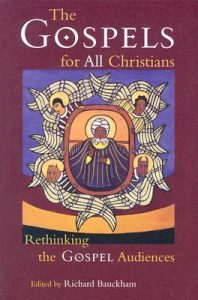 Before Richard Bauckham wrote Jesus and the Eyewitnesses (2006) he had challenged another common assumption among his peers with The Gospels for All Christians (1998). Since the 1960s it had been the common assumption that each of the canonical gospels had been written for a local religious community. Each gospel had been written for a small “group of churches . . . homogeneous in composition and circumstances.”
Before Richard Bauckham wrote Jesus and the Eyewitnesses (2006) he had challenged another common assumption among his peers with The Gospels for All Christians (1998). Since the 1960s it had been the common assumption that each of the canonical gospels had been written for a local religious community. Each gospel had been written for a small “group of churches . . . homogeneous in composition and circumstances.”
Each gospel was generally thought to have addressed the particular situation facing its community. Accordingly the gospels could be read as allegories that told us more about those communities than they did about the events in the life of Jesus.
- James Louis Martyn led the way in 1968 with History and Theology in the Fourth Gospel. He argued that the Gospel’s account of the excommunication from the synagogue of the man healed of blindness was about “the formal separation of the church and synagogue” occasioned by the decision of the rabbis at Jamnia to reformulate a standard curse against heretics to include Christians in the late first century.
- Theodore Weeden followed in 1971 with Mark: Traditions in Conflict which persuaded many that when the Gospel of Mark characterized the disciples as completely failing to understand Christ it was in order to criticize Christians in the author’s own day who taught that Christ called them to perform signs and miracles to demonstrate the truth of the gospel. The author represented those in his community who believed Jesus called his followers to suffer and die with him.
- Philip Esler, 1987, Community and Gospel in Luke-Acts, finds in the image of the “flock” in both Luke and in Acts (the church at Ephesus) a symbol of a small church that is beset by dangers both within and without. The implication (as described by Bauckham) is that the author is addressing that one small troubled community and not the entire church.
- Andrew Overman, 1990, Matthew’s Gospel and Formative Judaism, explained the gospel as an expression of the struggle of a Galilean Jewish community in conflict with another Jewish sect moving towards what was to become rabbinic Judaism.
What grounds does Richard Bauckham offer for us to think that the gospels were not written for local churches but rather for “all Christians” in all churches everywhere? Or at least a very generalized Christian audience wherever its churches were to be found. Continue reading “For Whom Were the Gospels Written?”
